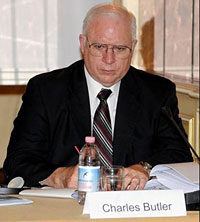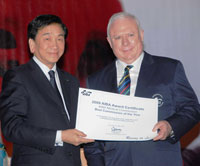Charles Butler, M.D.
By Cary Estes
 |
Butler attends a 2009 AIBA Executive Committee meeting in Milan, Italy. |
Charles Butler, M.D., stands ready to deal a blow to the premise that boxing—at least on the regulated amateur level—is inherently dangerous.
A 1971 graduate of the School of Medicine at UAB, Butler has become one of the sport’s top doctors. He is one of four members on the Executive Committee of the International Boxing Association (AIBA) and chairman of the AIBA Medical Commission. He also serves as president of the American Board of Ringside Medicine.
Butler has had a passion for the sport nearly his entire life. His father boxed for the University of Alabama, and Butler began watching his matches at the age of three. But as a physician who spent two decades as the cardiac surgery director for Michigan State’s Kalamazoo Bronson Hospital, one of Butler’s primary responsibilities is promoting health and safety. Inevitably, some people see a contradiction between his medical mission and the asperity of boxing.
“People usually enter into that discussion with a prejudice against boxing as a dangerous sport,” Butler says. Referring to an International Olympic Committee survey, he explains, “statistically, we’re the safest of all the contact sports. We have fewer incidents of injury than judo, wrestling and tae kwon do. Our concussion rate is lower than football and basketball.
“It’s even lower than ice skating. Skaters don’t wear head gear, and they fall all the time in practice,” Butler says. “Compare a skater’s head hitting the ice as opposed to wearing head gear and being struck with a gloved hand.”
Head injuries leading to dementia are the most obvious concern about boxing, and indeed, the sport’s professional landscape is littered with punch-drunk former champions. But Butler says that amateur boxers are closely monitored and regulated.
“We have the strictest concussion management of any sport in the world,” Butler explains. “When we see a boxer’s neck or arms drop, or see a vacant stare, that requires an immediate stoppage of the bout and suspension for 30 days with no activity. If there is any loss of consciousness—even for five seconds—the boxer cannot enter the gym for 90 days. If the boxer is unconscious for more than a minute and a half, it’s six months.”
 |
Ching-Ko Wuo, International Boxing Federation president and International Olympic Committee member, presents Butler with a "Best Commission of the Year" award in Baku, Azerbaijan, in 2009. |
In contrast, Butler notes, former University of Florida quarterback Tim Tebow incurred a serious concussion in 2009 game and returned to the football field two weeks later. “We wouldn’t have let him box,” Butler says, “but in football they put him back in.”
Butler chaired the Medical Jury—the physicians in charge of monitoring boxing matches—at the 2008 Summer Olympics in Beijing. These ringside physicians observe every detail from the moment the fighters enter the ring, and they have the authority to stop a match at any point.
Butler says he once halted a match after less than a minute because one fighter was reacting sluggishly. It turned out that the boxer had been knocked unconscious a week earlier in practice, but officials had not been informed.
“We’re looking for every clue,” Butler says. “We’re watching the eyes, the reflexes. Are his arms coming down? Is he spreading his stance? If he’s spreading his stance, he’s struggling for balance.
“We’re so safe because of the precautions we take,” he adds.
In addition to promoting safety, Butler says he enjoys helping young boxers, who predominantly come from poor backgrounds and broken homes. They are the reason he is so immersed in the sport that he made 23 overseas trips in 2008.
“I love these kids. These are good kids,” Butler says. “They don’t know how to express themselves, but they can come to the gym and channel their aggression. It’s a very good sport for them psychologically. We help build self-confidence in the young people in our society who need it most.”